 Sedation has long been a part of professional oral health care, most notably for helping patients with severe dental anxiety and phobia overcome their fears. However, many patients in Encinitas/San Diego who don’t fear oral health treatment also benefit greatly from the comfort and relaxation that sedation helps them achieve. For example, when complex treatment is required, especially procedures that may require more than one visit to complete, the right level of sedation can help make the process significantly more comfortable. (more…)
Sedation has long been a part of professional oral health care, most notably for helping patients with severe dental anxiety and phobia overcome their fears. However, many patients in Encinitas/San Diego who don’t fear oral health treatment also benefit greatly from the comfort and relaxation that sedation helps them achieve. For example, when complex treatment is required, especially procedures that may require more than one visit to complete, the right level of sedation can help make the process significantly more comfortable. (more…)
Can Implants Support an Existing Bridge or Denture?
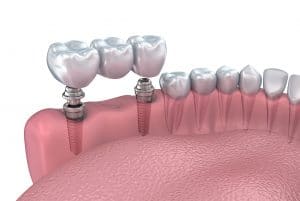 The most appealing thing about dental implants, which replace the roots of your lost teeth, is that they help keep your jawbone and oral health healthier and more vibrant following tooth loss. This means that you have a better chance of preserving your remaining teeth and oral structures thanks to the stimulation that dental implants provide. However, patients in Encinitas/San Diego who have dealt with tooth loss for a long time may question if they can still benefit from dental implants. Fortunately, you can, though your periodontist will have to determine if you’re a good candidate now or if you may require one or more prerequisite procedures first. (more…)
The most appealing thing about dental implants, which replace the roots of your lost teeth, is that they help keep your jawbone and oral health healthier and more vibrant following tooth loss. This means that you have a better chance of preserving your remaining teeth and oral structures thanks to the stimulation that dental implants provide. However, patients in Encinitas/San Diego who have dealt with tooth loss for a long time may question if they can still benefit from dental implants. Fortunately, you can, though your periodontist will have to determine if you’re a good candidate now or if you may require one or more prerequisite procedures first. (more…)
The Progression of Periodontal Disease
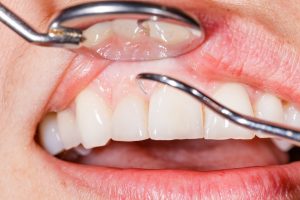 One of the reasons why periodontal disease is such a threat to your smile is because it’s progressive. Once it develops, it continues to grow worse the longer it’s left untreated, and many patients in Encinitas/San Diego don’t realize they have it until it becomes severe. Fortunately, your periodontal expert can help you address periodontal disease and restore your healthy smile no matter what stage it’s in. However, for the sake of your long-term oral and periodontal health, addressing it as soon as possible is always the best choice. (more…)
One of the reasons why periodontal disease is such a threat to your smile is because it’s progressive. Once it develops, it continues to grow worse the longer it’s left untreated, and many patients in Encinitas/San Diego don’t realize they have it until it becomes severe. Fortunately, your periodontal expert can help you address periodontal disease and restore your healthy smile no matter what stage it’s in. However, for the sake of your long-term oral and periodontal health, addressing it as soon as possible is always the best choice. (more…)
Good Reasons to Take Tooth Loss Seriously
 Your teeth are meant to last for life with proper care and maintenance. Unfortunately, tooth loss still remains a significant and common concern, and for many patients in Encinitas/San Diego, it can have several serious consequences. The good news is that most patients realize the importance of addressing their tooth loss as soon as possible to mitigate its long-term effects. However, for patients who don’t, we take a look at a few good reasons why taking tooth loss seriously is vital to your oral health. (more…)
Your teeth are meant to last for life with proper care and maintenance. Unfortunately, tooth loss still remains a significant and common concern, and for many patients in Encinitas/San Diego, it can have several serious consequences. The good news is that most patients realize the importance of addressing their tooth loss as soon as possible to mitigate its long-term effects. However, for patients who don’t, we take a look at a few good reasons why taking tooth loss seriously is vital to your oral health. (more…)
How Tooth Plaque Causes Gum Disease
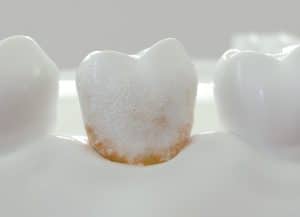 For patients in Encinitas/San Diego who deal with gum disease, it can be one of the greatest concerns for the long-term health of their smiles. However, despite the severe effects that it can have on your periodontal tissues and oral structures, gum disease begins as nothing more than plaque developing and calcifying on your teeth. Made up of hundreds of kinds of oral bacteria, plaque and its calcified form, tartar, give these microbes plenty of time to attack your teeth and gums. The acids and toxins they produce can lead to some of the most common and destructive issues, including severe gum disease. (more…)
For patients in Encinitas/San Diego who deal with gum disease, it can be one of the greatest concerns for the long-term health of their smiles. However, despite the severe effects that it can have on your periodontal tissues and oral structures, gum disease begins as nothing more than plaque developing and calcifying on your teeth. Made up of hundreds of kinds of oral bacteria, plaque and its calcified form, tartar, give these microbes plenty of time to attack your teeth and gums. The acids and toxins they produce can lead to some of the most common and destructive issues, including severe gum disease. (more…)
How LANAP Treats Periodontal Disease Comfortably
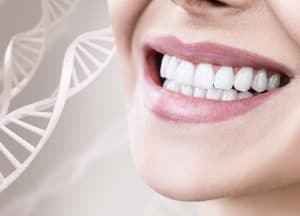 Treating gum disease is a highly personalized process. Not only are your gums unique to your smile, but so are the nature, extent, and location of your gum disease. Because treating the disease involves targeting it precisely (as well as the oral bacteria causing it), your treatment will have to be tailored to you, specifically. For many patients in Encinitas/San Diego, the addition of advanced lasers helps improve their periodontal treatment in a number of different ways, including offering improved results and a significantly more comfortable and precise process. (more…)
Treating gum disease is a highly personalized process. Not only are your gums unique to your smile, but so are the nature, extent, and location of your gum disease. Because treating the disease involves targeting it precisely (as well as the oral bacteria causing it), your treatment will have to be tailored to you, specifically. For many patients in Encinitas/San Diego, the addition of advanced lasers helps improve their periodontal treatment in a number of different ways, including offering improved results and a significantly more comfortable and precise process. (more…)
Do Dental Implants Really Last for Life?
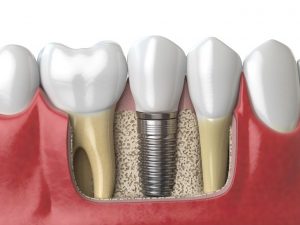 Your teeth are meant to last for life, even though there are many different things that could eventually lead to tooth loss if not addressed properly (like gum disease). Therefore, the best way to replace your lost teeth is with a prosthesis that also lasts for life, or as close to it as possible. For patients in Encinitas/Sand Diego, dental implants are often the best option. Implanted into your jawbone to replace your lost teeth roots, dental implant posts are biocompatible, meaning your jawbone will fuse to them as it heals following implant placement. With proper care and maintenance, the prosthetic teeth roots can last for life, giving your crown, bridge, or denture the support to last significantly longer than it would without it. (more…)
Your teeth are meant to last for life, even though there are many different things that could eventually lead to tooth loss if not addressed properly (like gum disease). Therefore, the best way to replace your lost teeth is with a prosthesis that also lasts for life, or as close to it as possible. For patients in Encinitas/Sand Diego, dental implants are often the best option. Implanted into your jawbone to replace your lost teeth roots, dental implant posts are biocompatible, meaning your jawbone will fuse to them as it heals following implant placement. With proper care and maintenance, the prosthetic teeth roots can last for life, giving your crown, bridge, or denture the support to last significantly longer than it would without it. (more…)
A Few Signs that It’s Time to Visit Your Periodontist
 When you stick to a consistent schedule of preventive dental health visits, your dentist can usually spot signs of trouble early, including periodontal (gum) disease. However, you don’t always need to wait until your dental visit to know that you might be experiencing the early stages of gum disease. For patients in the Encinitas/San Diego community, knowing what signs to look for and what to do when they spot them can be an important tool in successfully preventing or treating gum disease. (more…)
When you stick to a consistent schedule of preventive dental health visits, your dentist can usually spot signs of trouble early, including periodontal (gum) disease. However, you don’t always need to wait until your dental visit to know that you might be experiencing the early stages of gum disease. For patients in the Encinitas/San Diego community, knowing what signs to look for and what to do when they spot them can be an important tool in successfully preventing or treating gum disease. (more…)
What Everyone Should Know About Periodontal Disease
 Like most chronic dental diseases, periodontal disease isn’t inevitable. Despite the fact that it affects nearly 80% of adults to some degree, the condition commonly known as gum disease is highly preventable under the right circumstances. Those circumstances include consistently good hygiene, regular preventive dental care, and when necessary, the help of a periodontal expert. For patients in Encinitas/San Diego, the key to preventing or managing periodontal disease is often knowing as much as possible about the disease and how it affects their smiles. (more…)
Like most chronic dental diseases, periodontal disease isn’t inevitable. Despite the fact that it affects nearly 80% of adults to some degree, the condition commonly known as gum disease is highly preventable under the right circumstances. Those circumstances include consistently good hygiene, regular preventive dental care, and when necessary, the help of a periodontal expert. For patients in Encinitas/San Diego, the key to preventing or managing periodontal disease is often knowing as much as possible about the disease and how it affects their smiles. (more…)
A Few Questions About Dental Implants
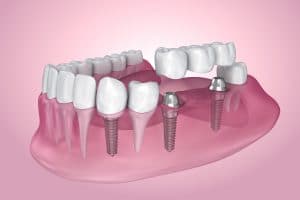 Dental implants have long been recognized by dental health professionals as the most comprehensive solution to replacing tooth loss. That’s because they not only restore your smile’s appearance, but also the unseen but vitally important of your lost teeth roots. For patients in Encinitas/San Diego, addressing tooth loss with dental implants helps them enjoy healthier, fuller, and more beautiful smile for longer. However, the benefits also include stronger and more youthful jawbone structure as well as a reduced risk of losing more teeth later. (more…)
Dental implants have long been recognized by dental health professionals as the most comprehensive solution to replacing tooth loss. That’s because they not only restore your smile’s appearance, but also the unseen but vitally important of your lost teeth roots. For patients in Encinitas/San Diego, addressing tooth loss with dental implants helps them enjoy healthier, fuller, and more beautiful smile for longer. However, the benefits also include stronger and more youthful jawbone structure as well as a reduced risk of losing more teeth later. (more…)



